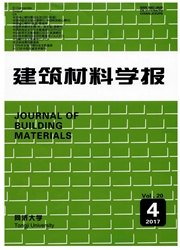

 中文摘要:
中文摘要:
基于混凝土腐蚀层厚度及腐蚀区混凝土抗压强度损失率的概念,建立了硫酸盐环境下混凝土试块的蚀强模型.根据该模型推导出混凝土抗压强度耐蚀系数计算公式,同时进行了3组全浸泡混凝土的腐蚀试验,并根据试验结果对混凝土抗压强度耐蚀系数计算公式进行拟合和参数分析.结果表明:根据所建立的模型得到的混凝土抗压强度耐蚀系数计算结果与试验结果吻合较好;硫酸盐环境下混凝土可划分为裂缝发展区、膨胀密实区和未腐蚀区3个区域;综合性的腐蚀系数可以反映混凝土配合比与抗硫酸盐腐蚀性的关系,腐蚀系数越大,抗硫酸盐腐蚀性越差.根据所建立的模型和计算方法能够评估和预测硫酸盐环境下混凝土的抗腐蚀性能.
 英文摘要:
英文摘要:
Based on the thickness of surface corrosion layer and the loss rate of compressive strength in corrosion region and according to the model of strength damage of corroded concrete, the test of three groups of concrete samples immersed in sodium sulfate solution for long time was carried out. The experimental results were fitted, and parameters were analyzed. It is revealed that the calculation results and test results are in good agreement. The results show that the concrete under sulfate environment may be divided into three regions: expansion dense region, crack development region and uncorroded region. The comprehensive corrosion coefficient may reflect relationship between concrete mix ratio and corrosion resistance, the higher the corrosion coefficient, the worse the corrosion resistance. According to the model of strength damage of corroded concrete and the computation method of corrosion resistance coefficient for compressive strength, concrete corrosion resistance under sulfate environment may be evaluated and forecasted.
 同期刊论文项目
同期刊论文项目
 同项目期刊论文
同项目期刊论文
 The applicable span-height ratio of steel reinforced concrete cross beam based on deflection control
The applicable span-height ratio of steel reinforced concrete cross beam based on deflection control 期刊信息
期刊信息
